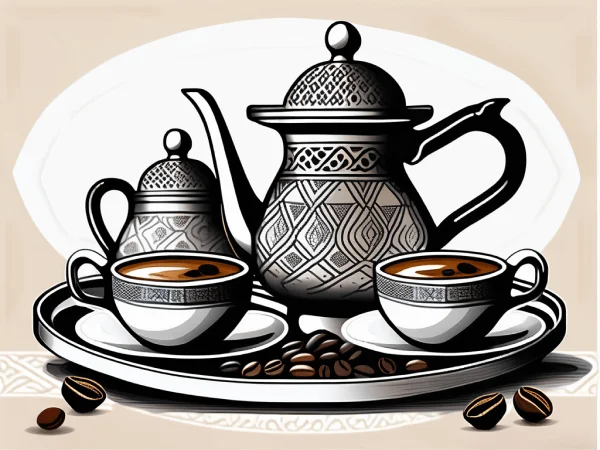Arabic coffee, also known as "qahwa" or "gahwa," holds a special place in Arab culture. It is more than just a drink; it is a symbol of hospitality, warmth, and tradition. If you're a coffee lover who wants to experience the rich flavors of this unique beverage, you've come to the right place. In this ultimate guide, we will take you on a journey through the art of brewing authentic Arabic coffee right in the comfort of your own home.
Mastering the Art of Arabic Coffee
A Step-by-Step Guide to Brewing the Perfect Cup
Let's start our Arabic coffee journey with the step-by-step process of brewing the perfect cup. While the techniques might vary across regions, the essence remains the same. First, gather your tools: a dallah (a traditional Arabic coffee pot), a small cup for serving, and a coffee grinder.

Begin by grinding the coffee beans to a fine texture. The beans are typically roasted to a medium to dark level, imparting a robust flavor profile. For a rich and authentic taste, it's crucial to use fresh coffee beans and grind them just before brewing.
Next, fill the dallah with water, ensuring the right proportions. The ratio of water to coffee is important, as it affects the strength of the coffee. Generally, a ratio of 1:10 (1 part coffee to 10 parts water) is recommended for a balanced taste.
Place the dallah over a low heat source, such as a burner or stove, and slowly bring the water to a boil. As the water heats up, a delightful aroma will fill your kitchen, signaling that you're on the right track.
Once the water reaches a gentle boil, add the freshly ground coffee to the dallah. Stir the mixture gently and let it simmer for a few minutes, allowing the flavors to infuse.
Finally, remove the dallah from the heat and let it settle for a moment. This step is essential for the coffee grounds to settle at the bottom, ensuring a smooth and clean cup of Arabic coffee.
The Cultural Significance of Arabic Coffee
Arabic coffee has deep cultural roots and plays a significant role in Arab hospitality. It is customary for hosts to offer a cup of Arabic coffee to their guests as a sign of respect and welcome. The preparation and serving of Arabic coffee follow age-old traditions, fostering a sense of community and connection.
Each aspect of Arabic coffee has a symbolic meaning. The dallah, with its unique design and ornate engravings, represents the generosity and wealth of the host. The small cups used for serving signify humility and unity, as everyone is served the same amount, regardless of social status.
The act of serving Arabic coffee is an art form in itself. The host gracefully pours the coffee in a single motion, ensuring that each cup is filled equally. The guest is expected to accept the cup with their right hand, as a sign of appreciation, and drink it slowly, savoring both the taste and the experience.
Exploring the Different Variations Across Countries
While Arabic coffee shares a common heritage, its flavors and preparations can differ across countries in the Arab world. Let's take a journey and explore the variations in Saudi Arabia, Turkey, Egypt, and Lebanon.
In Saudi Arabia, Arabic coffee is often spiced with cardamom, giving it a warm and aromatic flavor. It is traditionally served in small, handleless cups, known as finjan, alongside dates or sweets.
In Turkey, the coffee is prepared using a special pot called a cezve. The coffee is finely ground and boiled with water and sugar, creating a strong and sweet brew. It is served in small cups, accompanied by Turkish delight or baklava.
In Egypt, Arabic coffee is known as "ahwa" and is typically made with a blend of light and dark roasted beans. It is often flavored with spices like cinnamon or nutmeg and served in small cups with a side of traditional Egyptian pastries.
In Lebanon, Arabic coffee is brewed with a touch of rose water, adding a delicate floral note to the beverage. It is served in small, handleless cups called "sahlab" and is often enjoyed with a slice of baklava or maamoul.
Dive Deeper into the World of Arabic Coffee
Unveiling the Rich Coffee Culture of Saudi Arabia
Saudi Arabia boasts a rich coffee culture, deeply embedded in its history and traditions. Arabic coffee, known as "qahwa al-Bedouin," is often accompanied by dates, enhancing the overall experience. The coffee is mildly spiced with cardamom, adding a subtle warmth to every sip. In Saudi Arabian culture, coffee is a symbol of generosity and hospitality, and it is not uncommon for guests to be served multiple cups.

Turkish Coffee: A Tradition Steeped in History
Moving to Turkey, we encounter Turkish coffee, which has its own distinct identity. Turkish coffee, or "Türk Kahvesi," is renowned for its strong and bold flavor. The coffee grounds are finely powdered and slowly brewed in a special pot called a "cezve." Traditional Turkish coffee is served in small, handleless cups, accompanied by a glass of water and sweet treats like Turkish delight. Turkish coffee is not only a beverage; it is a reflection of Turkey's vibrant cultural heritage.
The Unique Flavors of Egyptian Coffee
Egyptian coffee, often referred to as "ahwa," is characterized by its rich and robust flavor. The beans are typically dark roasted and finely ground, resulting in a strong and aromatic brew. Egyptians enjoy their coffee with a touch of sweetness, so sugar is often added during the brewing process. Served in small cups, Egyptian coffee is synonymous with social gatherings, where friends and family come together to enjoy thoughtful conversations.
Lebanese Coffee: A Delightful Blend of Tradition and Taste
Lebanese coffee, known as "qahwa arabiyya," is a delightful blend of tradition and taste. Lebanese coffee stands out with its delicate flavors and enticing aroma, thanks to the inclusion of spices like cloves and cardamom. The coffee is brewed to perfection using the traditional dallah and is typically served in small, elegant cups. Lebanese coffee is more than just a drink; it is a cultural expression of Lebanese hospitality and warmth.
As we explore the world of Arabic coffee, it becomes evident that each country has its own unique approach to this beloved beverage. From the spices used to the brewing methods employed, every detail contributes to the distinct flavors and cultural significance of these coffees.
In Saudi Arabia, the coffee ceremony is a cherished tradition that brings people together. It is not just about the coffee itself, but also about the experience of hospitality and connection. The aroma of freshly brewed Arabic coffee fills the air, creating an inviting atmosphere that encourages conversation and bonding.
In Turkey, the art of making Turkish coffee is considered a skill passed down through generations. The preparation process is meticulous, ensuring that every cup is a masterpiece. The coffee's strong flavor is balanced by the accompanying glass of water, which serves as a palate cleanser. The combination of the rich coffee and the sweet treats creates a sensory experience that delights the senses.
In Egypt, coffee is a staple in daily life. It is enjoyed throughout the day, from morning gatherings to evening socializing. The bold flavor of Egyptian coffee is invigorating, providing a much-needed energy boost. The addition of sugar adds a touch of sweetness, enhancing the overall taste and creating a harmonious balance.
Lebanese coffee, on the other hand, is a refined and elegant beverage. The delicate flavors of cloves and cardamom infuse the coffee, creating a symphony of tastes. The brewing process itself is an art form, with the dallah being an essential tool in achieving the perfect cup. Lebanese coffee is often enjoyed in intimate settings, where friends and family gather to share stories and create lasting memories.
As we delve deeper into the world of Arabic coffee, we discover not only a variety of flavors but also a rich tapestry of traditions and customs. Each cup tells a story, reflecting the unique cultural heritage of its respective country. So, the next time you savor a cup of Arabic coffee, take a moment to appreciate the history and artistry behind it.
Unraveling the Secrets of Crafting Authentic Arabic Coffee
Essential Tools for Brewing Arabic Coffee
To brew authentic Arabic coffee, it's essential to have the right tools. Here are the key items you'll need to embark on your Arabic coffee journey:
- A dallah (Arabic coffee pot): This is the centerpiece of the brewing process, and the choice of a beautifully designed dallah can enhance the overall experience.
- Coffee grinder: Invest in a high-quality burr grinder to ensure consistent grind size and optimal extraction of flavors.
- Water kettle: Choose a kettle that allows precise control over the water temperature for a perfect brew.
- Small coffee cups: Opt for traditional Arabic coffee cups to capture the authentic spirit of the experience.
Key Ingredients for the Perfect Cup
While Arabic coffee is a simple drink, the choice of ingredients can greatly influence its taste. Here are the key ingredients you'll need:
- Coffee beans: Look for high-quality Arabica coffee beans for the best flavor. Experiment with different roasts to discover the level of darkness you prefer.
- Cardamom: This aromatic spice is an essential ingredient in many Arabic coffee recipes, adding a unique dimension to the flavor profile.
- Sugar: While optional, adding sugar during the brewing process is common in many Arabic coffee traditions. Adjust the sweetness to your preference.
Step-by-Step Instructions for Brewing Arabic Coffee
Now that you have the necessary tools and ingredients, let's walk through the step-by-step process of brewing authentic Arabic coffee:
- Start by grinding your coffee beans to a fine texture using your coffee grinder. Aim for a consistency similar to sand.
- Fill the dallah with water, using the recommended 1:10 ratio of coffee to water.
- Place the dallah on a low heat source and gradually bring the water to a boil.
- Add the coffee grounds to the boiling water in the dallah and gently stir the mixture.
- Allow the coffee to simmer for a few minutes to extract the flavors.
- Remove the dallah from the heat and let it sit for a brief moment to allow the coffee grounds to settle at the bottom.
- Serve the Arabic coffee in small cups, following the traditional pouring technique.
Understanding the Nutritional Value of Arabic Coffee
Arabic coffee is not only delicious but also offers several potential health benefits. It is a natural source of antioxidants and may improve cognitive function, boost metabolism, and provide a sense of relaxation. However, moderation is key, as excessive consumption of caffeinated drinks may have adverse effects.
Enjoy the Rich Flavors of Arabic Coffee
Now equipped with the knowledge and techniques to brew authentic Arabic coffee, you can embark on a flavorful journey right from the comfort of your home. Immerse yourself in the rich cultural traditions and experience the warmth and hospitality that Arabic coffee represents. So gather your ingredients, embrace the rituals, and indulge in the enticing aroma and taste of this age-old drink. Cheers!

